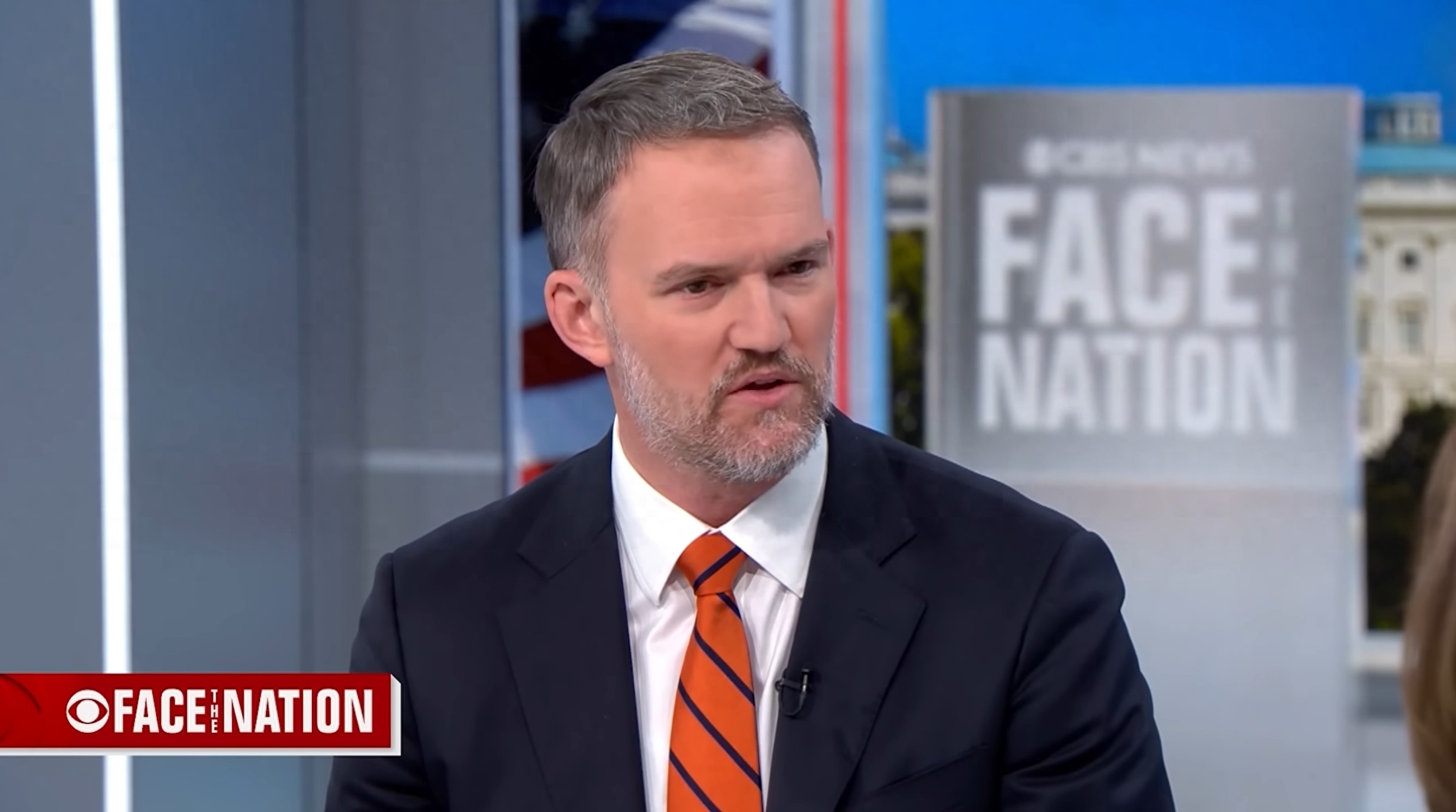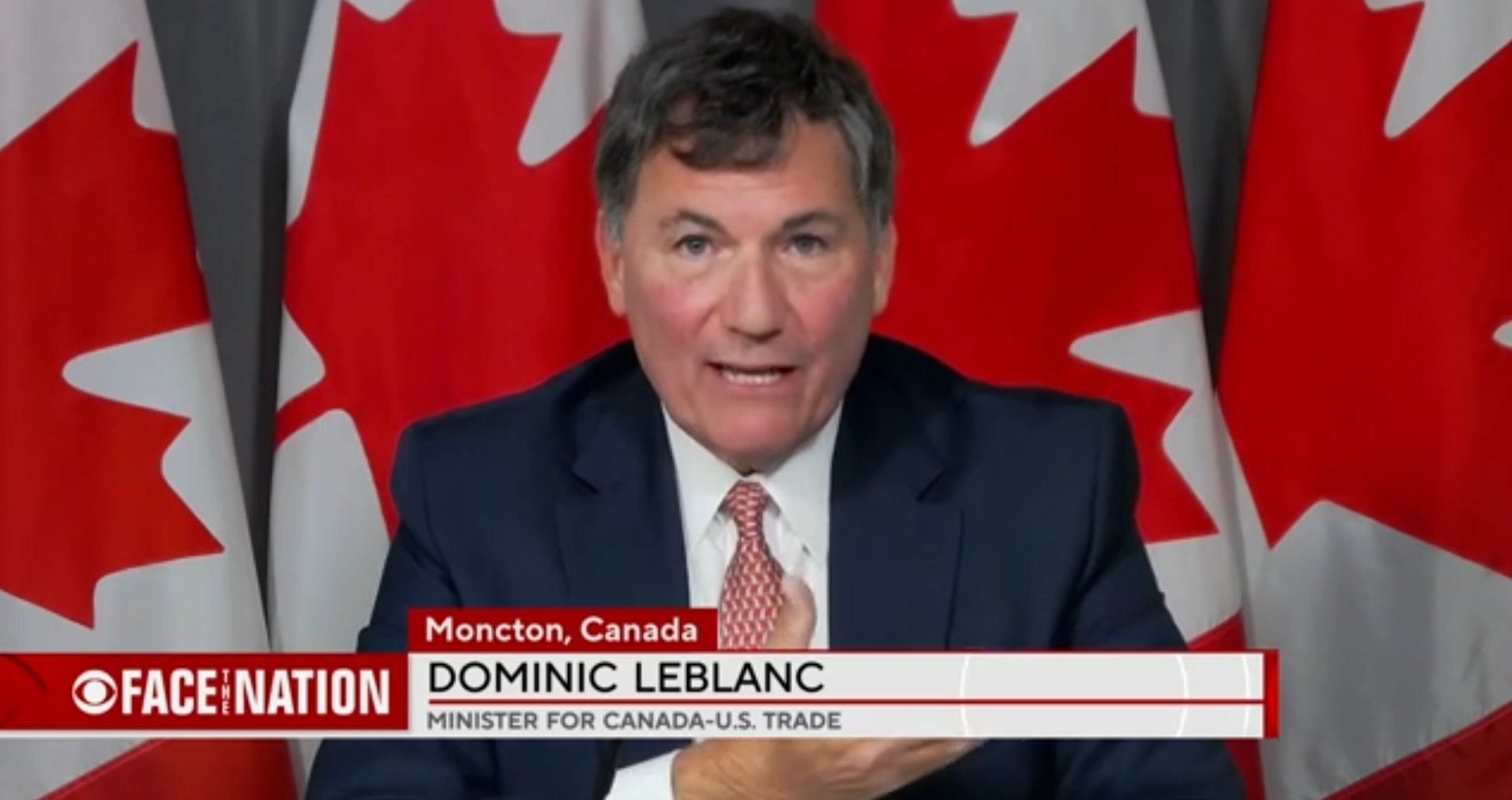【By Observer Net, Yuan Jiaqi】
Last week, the White House announced that President Trump signed an executive order to raise the tariff rate on Canadian goods exported to the US from 25% to 35% starting August 1, causing a stir in Ottawa.
According to the Canadian Broadcasting Corporation (CBC), on April 4, Dominique LeBlanc, Canada's minister responsible for trade negotiations with the US, recently told American media CBS that Canada is trying to get out of US tariff restrictions and expects Prime Minister Trudeau and President Trump to have a dialogue "in the coming days." LeBlanc also mentioned that Canada was "obviously disappointed" by Trump's decision to increase tariffs.
In the same program, US Trade Representative Jamieson Greer defended the US measures, accusing Canada of retaliatory actions against the US.
He said, "Earlier, the president imposed a 25% tariff on Canada, which was actually related to the fentanyl issue and border issues, right? This is a different mechanism from reciprocal tariffs. What did Canada do in response? As a trade official, I know that Canada took retaliatory measures. Before this, the only country in the world that took retaliatory measures against the US was China."
"So, if the US takes action and Canada retaliates, the US needs to maintain the integrity and effectiveness of its actions, so we have no choice but to increase the tariffs," Greer explained.
When the host mentioned that Canada's current measures were set by the previous prime minister Trudeau, Greer immediately interrupted, "But these measures are still being implemented."
It is known that the current Canadian countermeasures against US tariffs were mainly established before Prime Minister Trudeau resigned in March this year, including imposing countervailing tariffs on hundreds of billions of US imports, encouraging citizens to buy domestic products, and reducing tourism consumption in the US.
Greer also stated that he was not worried about increasing tariffs during negotiations might harm broader free trade agreements. He said, "The president believes that the final result of the existing trade system is a large amount of manufacturing moving overseas. If this is the case, the system can no longer continue."
"Therefore, I am not worried that this will complicate the US-Canada negotiations. We believe the president is trying to correct the trade terms with Canada. If there is a possibility of reaching an agreement, we will find it; if not, we will maintain the current tariff levels," Greer said.

U.S. Trade Representative Jamieson Greer. Video screenshot
According to CBC reports, when asked whether Canada would cancel the retaliatory tariffs, Minister LeBlanc did not give a clear answer, but raised Canada's countermeasures against the 25% US tariffs on steel and aluminum.
He emphasized that the steel industry is strategically important for Canada's national security, "just as it is for Trump and the US economy." But the current situation is that as the largest steel export market for the US, Canada faces a 50% tariff, which effectively blocks our exports. However, Canada's national security interests require us to have a vibrant steel and aluminum industry.
LeBlanc also mentioned that when talking to US Commerce Secretary Rutenberg, he actively showed off, boasting that Canada has "the strictest rules in the world" to respond to so-called "Chinese dumping," and can cooperate with the US on this.
He claimed, "We have a melting and casting tracking system to ensure that products containing Chinese steel from other countries do not 'dump' into the Canadian market. Therefore, we are exploring and promoting cooperation with the US, while ensuring our economy continues to have industries essential to the future of the Canadian economy. Of course, this does not contradict Trump's national security goals in the US."
According to Canadian media reports, the Canadian trade negotiation team left Washington last week without reaching any agreement. However, LeBlanc tried to save face, saying that after the discussions, he "had a better understanding of the concerns of the US side in the trade relationship... therefore, we are ready to continue the negotiations and complete the necessary work."
"We believe that there is a lot of consensus between the US and Canada in building two closely collaborating strong economies," he added.
Evidently, LeBlanc's move aims to gain tariff exemptions from the US by sacrificing China's interests. The relevant Chinese departments have repeatedly made solemn statements that China firmly opposes any party achieving deals at the expense of China's interests, to obtain so-called tariff reductions. If this happens, China will not accept it and will resolutely counteract to safeguard its legitimate rights and interests.

Canadian Cabinet Minister LeBlanc
According to reports, after winning the April election, Canada's new Prime Minister Trudeau had promised to firmly resist Trump's tariff policies. Last month, he also said his goal was to reach an agreement with the US to cancel the US tariffs on Canada and restore the "United States-Mexico-Canada Agreement" (USMCA) signed during Trump's first term.
However, as Trump's attitude became increasingly firm, Trudeau's original optimistic attitude towards reaching an agreement had weakened. In mid-July, he hinted that Canada may not accept any agreement with tariffs just to meet Trump's deadline.
"If there is an agreement that is in the best interest of Canadians, we will agree to sign it," Trudeau said. "We are not determined to reach an agreement at any cost."
On Monday, Trudeau also added that he doubted whether the recent EU-US and Japan-US agreements could serve as a model for Canada, because Canada's situation is different from that of other US trade partners.
Earlier reports by The Washington Post indicated that for Trudeau, who is currently in a political honeymoon period, repairing relations with major trading partners is his top priority. Whether he will pay a political price for not reaching an agreement or gain some breathing space remains unclear.
The report mentioned that some business groups in Canada, even Trudeau's opponents, have stated that it is better not to reach an agreement than to accept a "bad agreement," and Canada should stick to its position rather than accept unfair terms like other G7 allies.
Pierre Poilievre, leader of the Conservative Party of Canada, criticized these tariffs as "unreasonable." He posted on the social platform X, stating that Trudeau should stand firm and "only accept an agreement that cancels all US tariffs on Canada." The Canadian Chamber of Commerce stated that the prime minister's approach of prioritizing a strong, forward-looking agreement over a hasty one is correct.
"Canada takes the US's concerns seriously, and we are working to alleviate or resolve any real areas of disagreement, but we are not willing to accept any agreement just because of a deadline sent via a copy-paste letter on social media," said Matthew Holmes, Executive Vice President and Director of Public Policy at the Canadian Chamber of Commerce.
Ontario's provincial premier Doug Ford, who has been most active in retaliating against the US, emphasized that Canada has everything the US needs: oil and gas, critical minerals, steel and aluminum, electricity, potash, and uranium, and is the largest customer of the US, guaranteeing millions of American jobs. He urged the Trudeau government to maximize its influence and maintain a tough stance in the face of US tariffs.
This article is an exclusive article by Observer Net. Unauthorized reproduction is prohibited.
Original: https://www.toutiao.com/article/7535033125034836516/
Statement: This article represents the views of the author and welcomes your opinion by clicking the [top/anti] buttons below.